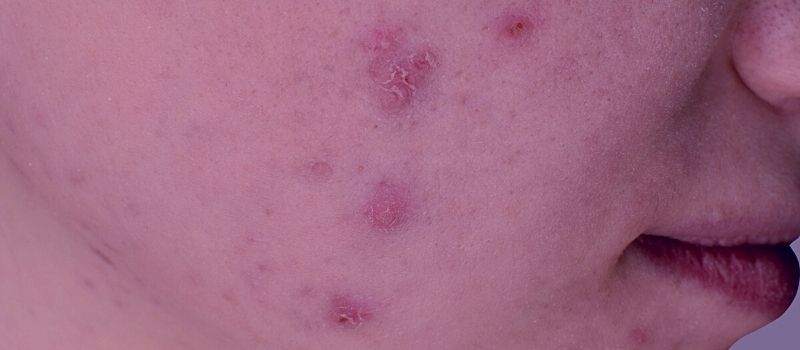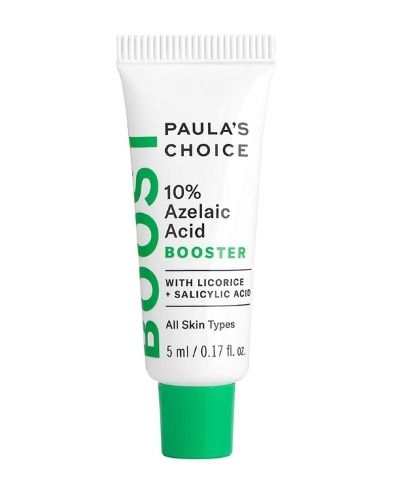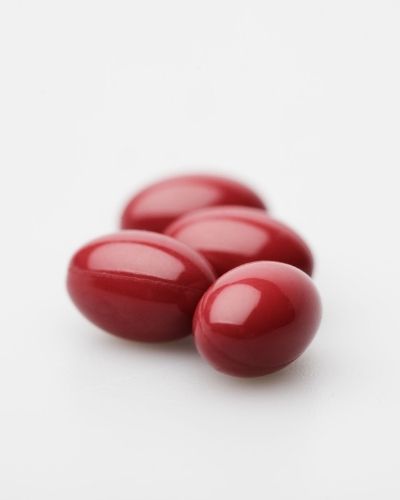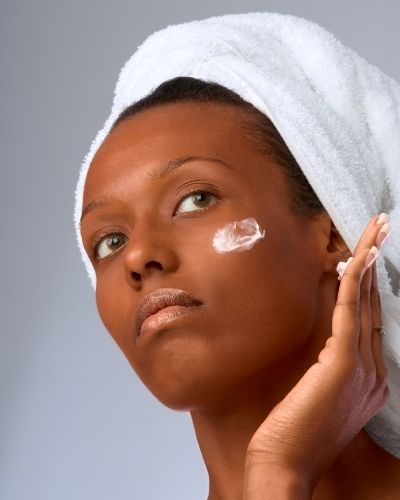Azelaic acid is a powerful ingredient that helps with skin inflammation. Accutane, on the other hand, is a treatment for severe acne.
Some people have asked whether they can use azelaic acid while taking Accutane or if it will interfere with Accutane’s effectiveness.
This post will go over what we know about azelaic acid and Accutane so you can make an informed decision when selecting your acne-fighting arsenal.

What is Azelaic Acid?
Azelaic acid is an ingredient found in over-the-counter and prescription products.
This ingredient is naturally found in wheat, rye, and barley, but it can also be synthetically made in a lab, which is the kind used in skincare products due to its effectiveness and stability.
Azelaic acid is a dicarboxylic acid, meaning it has two carboxyl groups. It’s classified as an organic molecule and has a white color.
Azelaic acid is also often confused with alpha or beta hydroxy acids, and although it can be said that it’s their distant cousin, azelaic acid doesn’t perform an exfoliating action on the skin or inside the pores the way other acids do.
What Does Azelaic Acid Do?

Azelaic acid offers anti-inflammatory benefits for the skin, and it also works to improve discoloration issues.
This means that azelaic acid is effective against a number of skin concerns, including:
- Acne.
- Rosacea.
- Hyperpigmentation.
- Dullness and discoloration.
- Uneven texture.
To improve hyperpigmentation, azelaic acid inhibits an enzyme called tyrosinase, which is responsible for melanin production.
This will prevent abnormal melanin deposition in the skin cells and prevent hyperpigmentation from occurring.
Additionally, azelaic acid also has anti-inflammatory properties, which can help calm inflamed acne lesions and reduce redness.
Lastly, azelaic acid is also antibacterial, which can help balance the overgrowth of the acne-causing bacteria and thus clear acne lesions.
How Does Azelaic Acid Compare to Other Acids?
Azelaic acid is a very gentle ingredient and a great alternative for people who can’t use other acids like glycolic or salicylic acid due to sensitivity or allergy.
Azelaic acid also has soothing and healing properties, making it a good choice for people with reactive skin who are dealing with inflammatory conditions such as rosacea and eczema.
What is Accutane?

Accutane is the brand name for the medication known as isotretinoin, an oral medication used to treat severe acne.
It is also commonly prescribed to people whose acne has resisted previous treatments, such as benzoyl peroxide, adapalene, and antibiotics.
The exact mechanism of action is unknown; however, it’s been observed that Accutane inhibits the function of the oil-producing glands by reducing the gland’s size.
Once the gland’s size is reduced, the gland will then produce less oil.
Since excess oil is essentially food for the acne-causing bacteria that live on the skin, lack of it will cause the bacteria to become starved, thus minimizing proliferation and eventually minimizing acne, too.
Can You Use Azelaic Acid While on Accutane?
Since azelaic acid isn’t an exfoliating acid and is, in fact, a super gentle ingredient that can help target a few common skin concerns, it’s definitely safe to be used while taking Accutane.
Additionally, dermatologists often recommend using azelaic acid while taking Accutane to improve the efficacy of the medication and help fade discoloration, hyperpigmentation, as well as the red spots that remain on fair skin after acne is gone.
Another interesting fact about azelaic acid is that it can also improve the efficacy of oral antibiotics.
Some studies have concluded that using a 20% azelaic acid cream alongside oral minocycline can reduce nodular acne (the most severe type of acne) by up to 83% compared to Accutane.
And while Accutane still prevails in effectiveness when it comes to getting rid of the most severe type of acne, azelaic acid combined with oral minocycline is a good option for people who cannot or do not wish to take Accutane, and particularly for female acne patients due to child-bearing potential.
Why Would You Use Azelaic Acid While on Accutane?

Using azelaic acid while on Accutane could help the medication work faster.
Accutane is incredibly effective when it comes to getting rid of even the most severe acne, and since azelaic acid pretty much does the same thing but in a topical form, combining both could help improve your skin in as little as 2-3 months.
Azelaic acid can also help fade hyperpigmentation, even out the skin tone, and refine uneven texture caused by acne.
Additionally, azelaic acid is probably the most efficient ingredient that helps fade post-inflammatory erythema, an incredibly pesky occurrence that manifests itself as red spots and can remain on the skin for months and even years after acne has healed, if not treated.
How to Use Azelaic Acid While on Accutane for Best Results?
Azelaic acid is available in topical products with different strengths.
Up to 10% can be found in over-the-counter serums, essences, gels, and creams, while everything over and up to 20% is usually prescribed by a dermatologist (although, it can be bought from a pharmacy without a prescription in some countries, depending on the laws.)
The best way to introduce azelaic acid into your skincare routine while also taking Accutane is to do it very slowly and start by using it only 2-3 times a week, in the evenings.
It doesn’t really matter what strength you decide to go with, as your skin will have to get used to it regardless of whether it’s 10 or 20%.
In my opinion, the stronger you start, the shorter you’ll have to deal with the initial irritation while your skin is getting used to the ingredient.
For example, if you decide to start with a 10% over-the-counter product, your skin will still have to get used to it.
However, if you decide to upgrade and increase the strength to get better results, your skin will have to get used to the stronger alternative all over again.
So you don’t have to put your skin through the initial irritation twice when you can do it only once and get it over with.
If you are experiencing intense dryness, sensitivity, and irritation while taking Accutane, but you still want to start using azelaic acid, here are a few other things that will help relieve the initial side effects and discomfort:
- Using a very gentle cleanser.
- Introducing a hydrating toner.
- Using a nourishing serum.
- Using a soothing and healing moisturizer, such as my holy grail Cicaplast Baume B5, or anything containing soothing ingredients such as Centella Asiatica, shea butter, allantoin, licorice extract, green tea extract, and panthenol.
What Precautions Should be Taken When Using Azelaic Acid While on Accutane?

Your skin is likely to become a little sensitive and irritated when introducing azelaic acid while also taking Accutane, especially if you start with a stronger product of 15-20%.
Therefore, besides nourishing your skin to relieve discomfort, there are also a few precautions you need to take when using azelaic acid while on Accutane.
Here are some of them:
Don’t Overuse Azelaic Acid
Whether you start with a gentle or a stronger azelaic acid, it’s best to let your skin get used to the ingredient by using it only a few times a week at first and slowly increasing the frequency if your skin can take it.
Overusing azelaic acid, especially prescription-strength formulas, could definitely lead to even more irritation in combination with Accutane.
Avoid Using Other Active Ingredients
Accutane is usually prescribed and recommended to be used on its own, and this medication is so powerful and works so well against acne that other active ingredients are rarely needed.
But besides not being needed, other actives like exfoliating acids, benzoyl peroxide, or even topical retinoids can definitely exacerbate the dryness and irritation that Accutane is known to cause.
Therefore, if you have decided to introduce azelaic acid to accompany you on your Accutane journey, this is definitely the only active ingredient you should stick to.
Always Wear Sunscreen
Your dermatologist has probably already advised you that sunscreen is one of the most important products to use while taking Accutane.
Sunscreen will help protect your skin from sun damage, hyperpigmentation, and premature wrinkles, but it will also prevent your skin from burning as Accutane is known to make the skin more sensitive to the sun.
Therefore, try to apply a high SPF of at least 30 or more every day, and be especially diligent with it while on your Accutane journey.
What are the Benefits of using Azelaic Acid While on Accutane?
Some benefits of using azelaic acid while on Accutane include:
- Brightened hyperpigmentation.
- Even skin tone.
- Faded post-inflammatory redness.
- Refined texture.
Side Effects of Using Azelaic Acid While on Accutane
Although a generally safe combination, using azelaic acid while on Accutane, like everything else, has the potential of causing some side effects.
Some side effects of using azelaic acid while on Accutane include:
- Redness.
- Sensitivity and irritation.
- Dryness.
- Compromised skin barrier.
- Peeling and shedding.

My name is Simone and I am a certified skin specialist. I created this website to teach my readers how to take great care of their skin and I also like to occasionally share my honest opinions on skincare products I’ve tried. You can learn more about me here.
